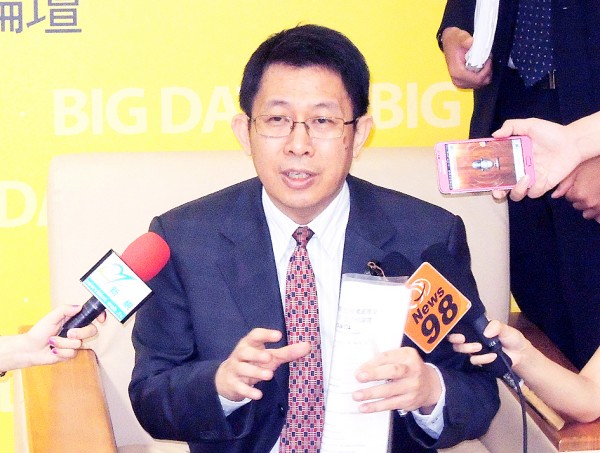《TAIPEI TIMES 焦點》 Minister apologizes to parents

Minister of Education Chiang Wei-ling talks to reporters at New Taipei City Hall yesterday about the new joint entrance exams for junior-high graduates. Photo: CNA
OUTCRY: Many parents have raised concerns that the new ‘school preference section’ could cause their child to end up being relegated to a lower-ranked school
By Stacy Hsu / Staff writer, with CNA
Minister of Education Chiang Wei-ling (蔣偉寧) yesterday apologized for the unease caused by the new 12-year national education system, which has caused concerns among junior-high students participating in the first Comprehensive Assessment Program and their parents, mainly due to what many say is its poorly designed mechanism to choose a school.
Chiang issued the apology on the sidelines of a forum held in New Taipei City yesterday morning to welcome University of Oxford professor Viktor Mayer-Schoenberger, the co-author of business bestseller Big Data: A Revolution that Will Transform How We Live, Work and Think.
The forum was briefly interrupted when two protesters held up a cardboard poster that read: “Minister, please help [our children] fill in their school preference forms.”
The most controversial part of the new system, which is set to take effect in August, is the ranking system that schools must adhere to when the numbers of students wanting to study at a school exceeds its enrollment quota.
While different administrative regions are allowed to design their own ranking system and decide how many and what aspects of students’ performance they want to evaluate, they must all include a section — the “school preference section” (志願序) — where the order in which a student lists their choice of schools is taken into account.
Many parents have raised concerns that the inclusion of the “school preference section” could cause their children to end up being placed in lower-ranked schools, as they will lose one point for each school that they list on their preference form, but are ineligible to enter.
“I think the most ideal solution to this problem will be grouping several schools with similar levels of prestige together, so that students will not risk losing [too many] points just because they change [the order of] their preferred schools,” Chiang said. “We will conduct a thorough and proactive review [of the ranking system].”
Chiang also pledged to “properly handle” the problem caused by the ranking system’s overemphasis on Chinese composition writing skills, which is placed relatively high in the system’s order of priorities that is referred to when two or more students have the same score.
“The impact of the problem has been particularly felt by students in the Taipei-Keelung metropolitan area, as they account for the largest proportion of participants in the program this year,” Chiang said.
Chiang said he would re-examine the system from the perspective of the parties concerned and endeavor to prevent it from causing any negative impact on students’ education.
“I am deeply sorry to those who are affected by [the deficiencies] in the new education system,” Chiang said.
新聞來源:TAIPEI TIMES










